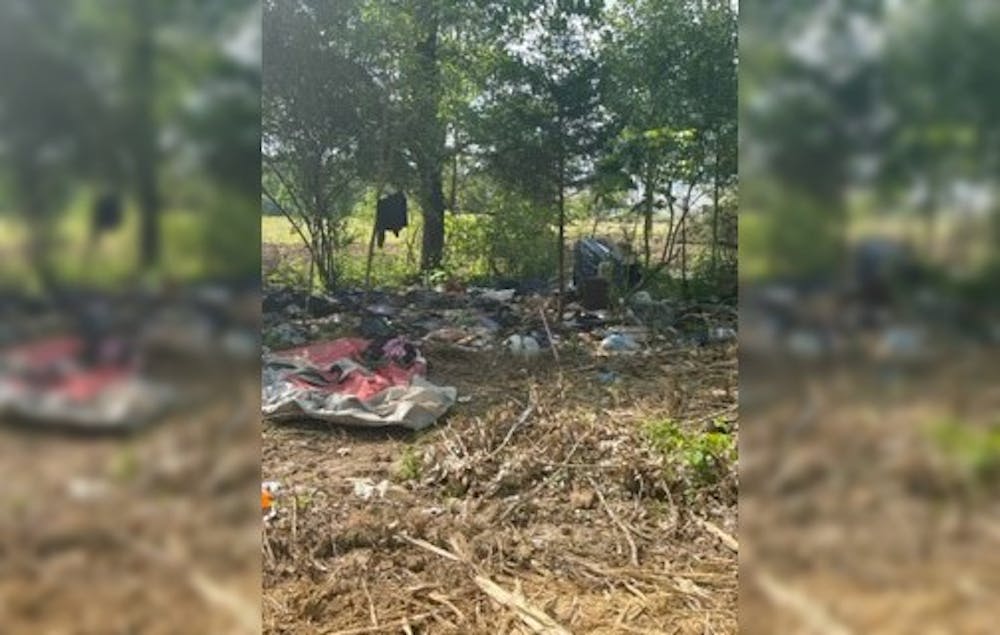On June 8, Monroe County commissioners set out to evacuate and clear the property behind the At Home store in Bloomington using county funds. This was the result of complaints from store employees and other residents who saw members of the unhoused community living there. The Bloomington police and city employees cleared a similar camp in Seminary Park a year ago.
The cleanup started on June 3, one day after all residents had to evacuate the county-owned land, the article said. County commissioners worked with volunteers from Beacon and other unhoused community advocacy groups to collect and set aside personal belongings for the former residents.
Harry Collins, a Bloomington Homeless Coalition advocate, told the Herald-Times that people in the encampment had been living there for three or more years, undetected in the high brush and trees. He said after a resident set up camp closer to the store, people started to complain about the camp.
Collins said he understood the mayor’s obligations to city residents and business owners but was uncertain about the camp residents’ success in finding other places to live.
There were also several traces of hypodermic needles and hazardous waste. According to the article, commissioners spent $18,000 on an agreement with Bio-One and no more than $157,000 on one with Crider&Crider to clean toxic and land waste, respectively.
Greg Crohn, the County Facilities and Fleet Manager at the time, said in the first week, Bio-One and the Monroe County highway department worked in tandem.
Bio-One went through the camps and took items considered as personal effects to separate storage containers. Then, the highway department came in with loading equipment and placed any materials Bio-One considered “caustic chemicals,” or causing bodily harm, into 40-yard dumpsters.
Crohn said the clean-up called for nine 40-yard dumpsters because of the number of needles and other hazardous materials, including liquids used to produce methamphetamine.
“It was originally planned to only take five days for Bio-One to be able to clean up the site, but we found a much larger volume than what was previously anticipated so that it ended up taking another week to get clear,” Crohn said.
Penny Githens, a Monroe County Commissioner, said the contract with Bio-One ended up lasting twenty days. She said in Indiana, it’s still illegal to possess a syringe, and when people moved, they ended up dropping and leaving them.
“It became a serious health hazard, and the function of the property was for drainage,” Githens said.
She said once the commissioners were made aware of the campers, they worked with people from Beacon and Wheeler Mission to clean the property and tell residents they had 72 hours to vacate and two weeks to retrieve any personal belongings found in the process.
According to the Indiana Housing and Community Development Authority, the point in time count for Indiana in 2021 was 3,029. This statistical figure represents the number of people facing homelessness on January 27, 2021. Six-hundred and sixty-two people recorded in this census were unsheltered, and the remaining were in an emergency, transitional or veteran-specific housing.
“It’s hard because we do have a lot of homeless in our community, and they need a place to go,” Githens said. “But the property behind At Home has no water, no facility for sewage, no trash pickup — it wasn’t a good situation.”
She said she didn’t disagree with Harry Collins in terms of the displacement of the camp residents. The county is actively trying to reduce those issues with other initiatives such as the Heading Home initiative.
Githens said several local organizations such as Wheeler Mission and Beacon offer temporary and permanent housing options like Crawford Homes and the Kinser Flats complex for those who are without homes.
After COVID-19, Githens said the county commissioners were prioritizing housing for the unhoused and allocated $200,000 to the Township trustees, who play a significant role in housing-related financial difficulties.
She said after the Heading Home program started, it became more important to make homelessness rare, brief and nonrepeating.
“I’m glad I live in a community that provides for others,” Githens said. “Hopefully we can push more assistance into the townships and fewer people will be unhoused.”






